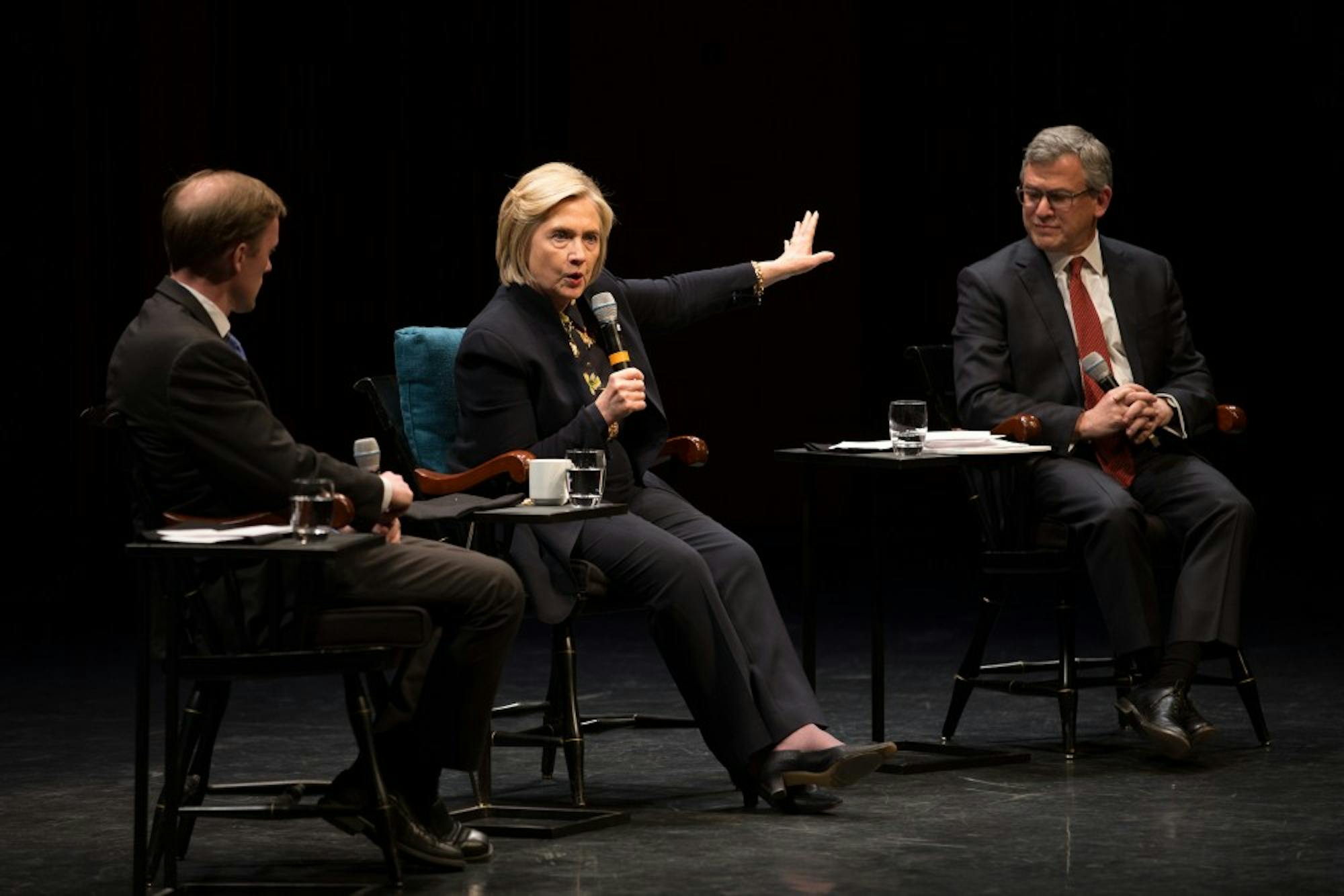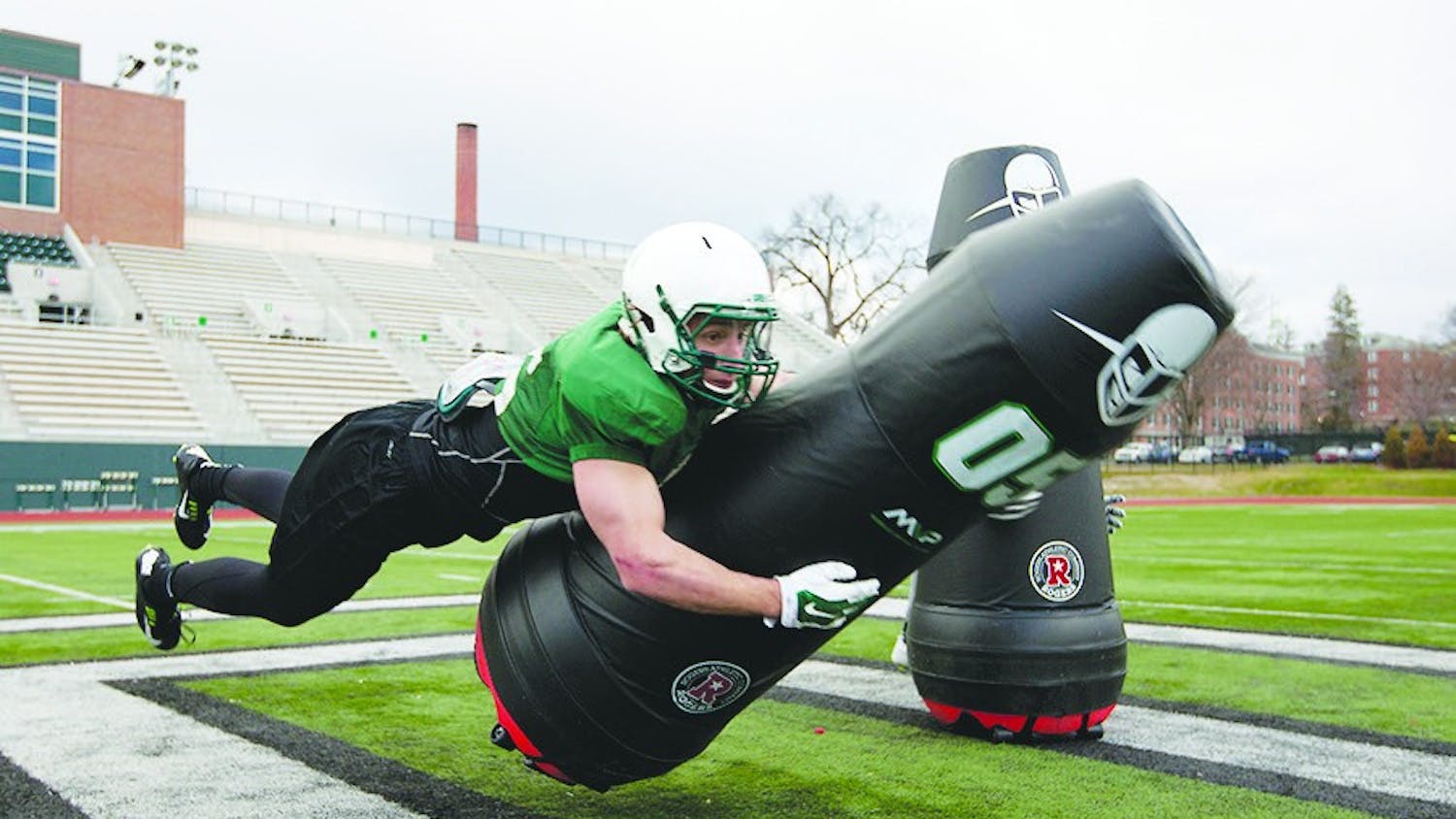With around 900 people packed into Spaulding Auditorium yesterday and latecomers turned away for a lack of remaining seats, the Dartmouth community took part in a conversation with former Secretary of State Hillary Clinton and two of her former aides. The 2016 Democratic presidential nominee addressed the Iran nuclear deal, the 2016 election, impeaching President Donald Trump and empowering women in public service.
Delivering this year’s Obenshain Family Great Issues Lecture, Clinton shared the stage with former State Department director of Policy Planning Jake Sullivan and John Sloane Dickey Center for International Understanding director Daniel Benjamin, who invited her to campus. Prior to the lecture, the Dickey Center staff members collected questions from attendees to ask Clinton, which primarily drove the discussion.
To begin the talk, Sullivan asked Clinton to address recent news about Iran stepping back from the Joint Comprehensive Plan of Action — which forms the basis of the Iran nuclear deal — and U.S. military engagement in the region. Clinton criticized Iran’s movement away from the deal and the Trump administration’s decision to pull out of it last year.
“My argument has always been to put a lid on the nuclear program, then deal with all the other problems that Iran causes in the region and around the world,” Clinton said.
Clinton said that the current administration may harbor intentions to provoke Iran and stressed the danger of miscalculation on either side of the conflict.
“I worry greatly that, number one, there is some desire on the part of this administration to provoke something,” Clinton said. “I don’t think we can, unfortunately, rule that out.”
In regards to special counsel Robert Mueller’s recently-released Report on the Investigation into Russian Interference in the 2016 election, Clinton said that there are two “inescapable” conclusions that the public should draw.
“The first is — and this is the words of the report — that Russia conducted a sweeping and systemic interference in our elections,” Clinton said. “And that Donald Trump obstructed justice.”
Clinton also emphasized the severity of Russia’s cyberattack on the 2016 U.S. presidential elections, which she said she fears will affect the upcoming 2020 election.
“If you are an American, the idea that our election is being trifled with, being impacted and maybe being determined by Putin and the Kremlin, and his intelligence service in the military, the GRU, and all of their assorted allies and agents — that should give us heartburn.” Clinton said. “We cannot have a strong relationship with Russia, for good or ill, if we basically allow them to undermine the basic exercise of our democracy.”
She expressed doubt that the current administration could foster healthy democracies worldwide, especially with the threat of Russian interference.
“I am well aware that [Putin] thinks he has died and gone to heaven, having the current occupant of the Oval Office,” Clinton said.
On the topic of impeaching President Trump, which some Democrats have advocated for, Clinton emphasized that a “deliberate but expeditious” investigation should be conducted before reaching a conclusion on impeachment, predicting that the Supreme Court is likely to make the final judgment. She advocated for making the strongest possible case to support subpoenas against President Trump.
“I don’t want us to look like we are just jumping to it,” Clinton said. “I want there to be a process that could be defended — that can serve as a basis for court challenges.”
In response to a question about female empowerment worldwide, Clinton responded that the cause needs more advancement despite its progress over the last few decades. She also stressed that the U.S. should use its international leadership role to continue to push for women and human rights.
“[Fully empowering women is] still the unfinished business of the 21st century,” Clinton said. “So this is a really important and complicated time, for the continuing emphasis on women’s rights or human rights, and using the American bully pulpit, American aid, American diplomacy, to keep pushing countries so that they can pay attention and hopefully follow through.”
In what was one of her more candid responses during the event, Clinton spoke about the myriad of “conspiracy theories” surrounding her during her time as a public servant. Benjamin remarked that the rumors about her during the ’90s seemed to be “child’s play” in comparison to the rumors that surfaced during her run for the presidency, to which Clinton emphasized the role social media played in exacerbating the spread of misinformation, especially during the 2016 election.
“I don’t understand why I rile these people on the right so much,” she quipped.
John DeSantis, a College librarian, said that he was pleased to see Clinton and was satisfied with the content and format of the lecture. He added that it was helpful to have two people he knew her well — Sullivan and Benjamin — engage her in dialogue as part of the event.
Before speaking at Spaulding, Clinton spoke privately in the Hanover Inn with Dartmouth students in two different meetings — the first with the War and Peace and Fellows and the second with Benjamin and Sullivan’s classes, GOVT 85.27, “Terrorism & Counterterrorism” and GOVT 84.36, “Future of the International Order,” respectively. Her discussion with the War and Peace Fellows covered topics including U.S. decision-making on foreign policies, American students’ engagement in politics and gender-oriented foreign policies initiatives, according to War and Peace fellow Jennifer West ’20.
West said that while she appreciated Clinton’s visit to campus, she also hopes that Clinton’s lecture will inspire college students to stay engaged with politics throughout the 2020 presidential election.
“I hope that college students see this as an opportunity to engage with politics and as such I hope they would be motivated to stay engaged in and stay involved with politics throughout the 2020 elections,” West said. “And I also think that events like these help to demonstrate how important it is for young people to be informed about political issues that affect us.”




